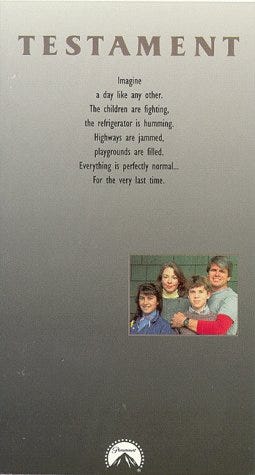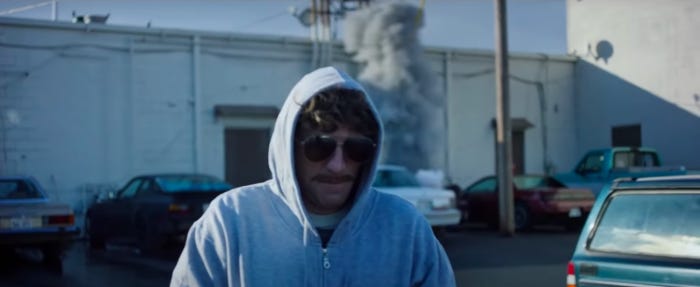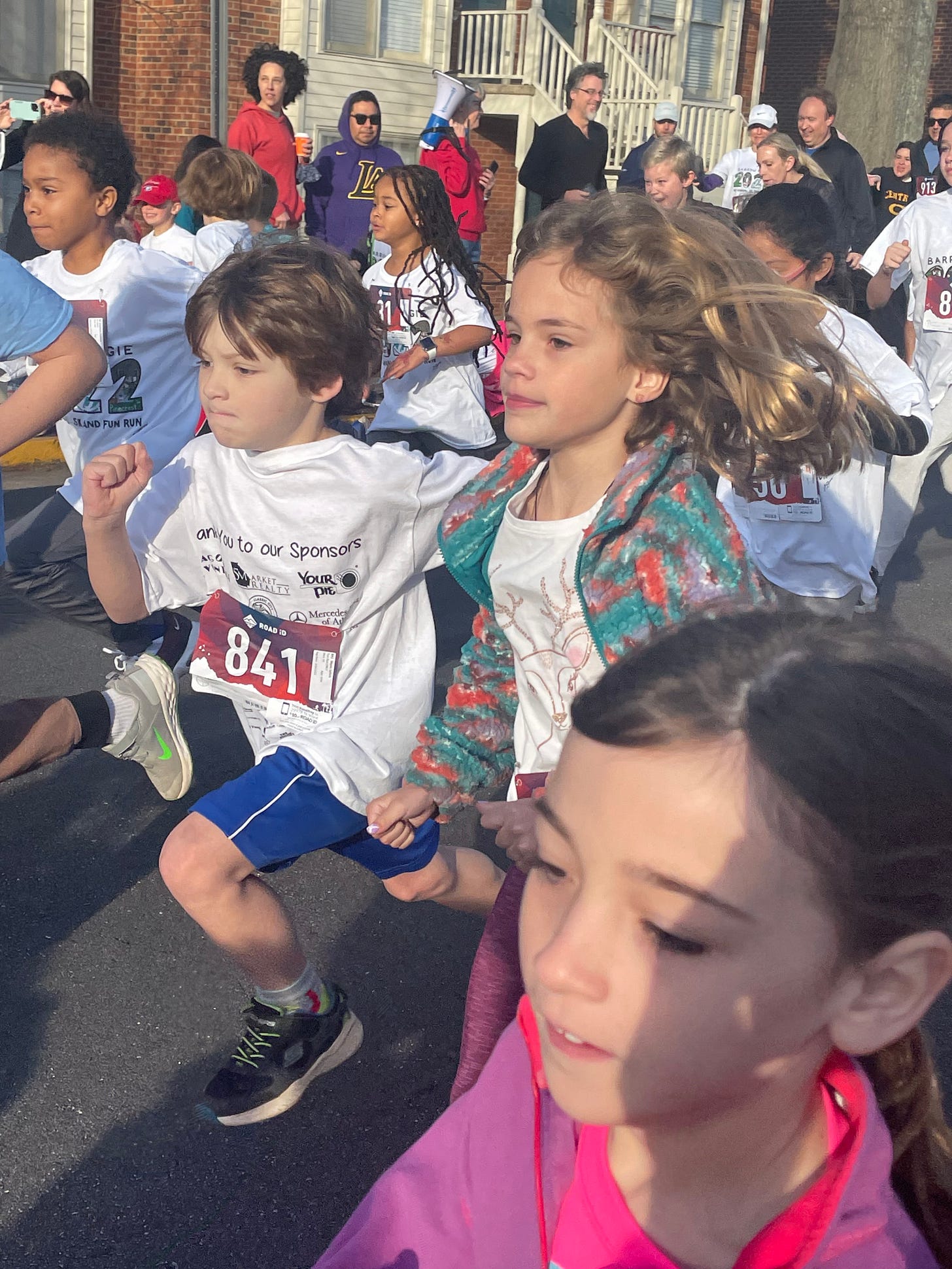Volume 4, Issue 5: Ozzie Smith
"The memories this guy is giving these fans will last for a lifetime."
Here is a button where you can subscribe to this newsletter now, if you have not previously done so. I do hope that you enjoy it.
A few years ago, I wrote what I still believe to be one of the strongest pieces I’ve ever written, what used to be my annual fill-in for Drew Magary’s Jamboroo column and what turned out to be one of my final pieces for Deadspin. It was called “We’ve Forgotten How To Fear.” It was about a lot of things, about the 1983 film Testament (a movie about a suburban California family trying to move forward in the wake of a global nuclear attack), about what it felt like to have someone like Donald Trump as the most powerful person on the planet, about the gnawing sensation that everything could come crashing down at any moment.
But what the piece was really about, when I look back at it now four-and-a-half years later, is being a parent. When I first saw Testament—and you can hear Grierson (whom I watched it with for the first time back in 1992) and I discuss the film, including a moment when I almost break down when I talk about the movie’s last shot, in this Grierson & Leitch episode taped in person just two weeks ago—I was in high school and had no idea of the stakes of anything. (And, in the wake of the fall of the Berlin Wall, no real palpable fear of apocalypse anymore either.) I was moved by the film then, but more by its artistry and its restraint than by any particular relevance to my life at that moment. But when I watched it for the Deadspin piece in 2017, all I could think about was my children—and my inability to protect them from anything. When I was 17, I related most to the teenagers in the film who see their future suddenly, violently taken from them. When I watch it today, I am the father who is away from his family when catastrophe strikes, and the mother who sees all she has ever cared about slowly disintegrate in front of her. I cannot fathom how it must have felt for my parents, who, when the film came out, had a seven-year-old son and a three-year-old daughter, and lived in a world where the fear of nuclear annihilation regularly led the nightly news. How much of the real world do want to hide from your children, and how much do they need to know?
When my oldest son William was born in 2011, I did not anticipate having this be a central question of my life as a parent. It sure has turned out that way though.
****************
Our kids have been through so much already. I wrote a whole cover story for New York magazine about the perils of raising boys in the Trump era, and that was two years before they were slapped with a pandemic that would force them to stay home and have school on their laptops while watching just about every adult in their lives lose their ever-loving minds. My sons have seen a once-in-100-years plague, armed insurrections, the rise of totalitarianism, a climate in increased, violent revolt, another aggressive expansionist madman in Europe and, worst of all, the Chicago Cubs winning the World Series. They have lived a lifetime already, and they’re not even to middle school yet. And they are of course just getting started. Poll after poll shows that the average American is more pessimistic about the world, and their place in it, over the next several decades than at any other time in history. Those next several decades are exactly the world that my children are heading into. These calamities are not some distant moment in the future for them. They are their lives.
I cannot protect them from this. But I also do not know how much to prepare them, or if that’s even possible. I also don’t know what purpose it serves anyway. This is the time in their lives to be silly, thoughtless kids, rolling around in the dirt, eating grass, making fart jokes. The utility of them living in constant fear is difficult to locate. There is value in them not actually knowing.
After all: I didn’t. I have seen many fellow Generation Xers this week crow about constantly living with existential peril, as if we have some sort of corner on the market.

But while I know intellectually that I grew up in the world of Testament and The Day After, when I look back at my childhood, I don’t remember it that way. I suppose I was aware that my parents were worried about nuclear war—I remember them telling me about just how scary the Bay of Pigs incident was, another moment when people felt like we might be at the end of everything, one that happened more than a decade before I was born—but that fear never filtered down to me, or really anyone that I knew. Sure, people from my generation will tell you they lived through the No Nukes era, an era where the whole plot of Superman movies was that he was going to round up all the nuclear weapons and explode them in space.
And they did. But that is not how I actually remember my childhood, and I doubt many others my age remember it that way either. My childhood was full of … kid stuff. Playing baseball at the neighbor’s place. Watching cartoons on Saturday mornings. Swimming at Lake Shelbyville. Running around the playground at recess. Staying up late with my Dad to watch Illini basketball games. Kid stuff. The larger societal issues were all there, and I was vaguely aware of them, the same way that you’re vaguely aware of the people your parents work with, or the cousins you only see at Thanksgiving, or that time when you had to sit in the back of the car while your parents waited in line three hours for gas. The outside world, when you are a kid, is full of temporary inconveniences that briefly get in the way of the business of being a kid, but only briefly. They are the problem of adults. We can all say now we were constantly worried about nuclear war, or the world falling apart. But I remember playing with G.I. Joe and Voltron a lot more than I remember worrying about anything. Worrying is for adults.
Is that because my parents shielded me from the scary things? Or was I, as a child, simply incapable of concentrating on them … or really much of anything? When you’re a kid, everything that isn’t directly in front of you might as well be happening millions of miles away. This is a blessing—but also something other than that.
Because ultimately I do believe there is also value in knowing what is actually going on. As unsettling as the last three days of news has been, how it feels the world order shuffling once again, perhaps ending in something very dangerous, there is hope and power in knowing. There are examples to follow everywhere. I want my children to know a leader who refuses to abandon his people, who says he wants “ammunition, not a ride.” I want them to how brave and resilient the Ukrainian people have been defending their country. I want them to know about The Ghost of Kiev, even if she isn’t real. I want them to know there are kids over there, kids just like them, staying strong, living right in the middle of this.


This is the balance of growing up in the middle of history, of having the world constantly change around you and having so little history of your own to compare it to. I do not want to put adult anxieties on the wonder and innocence of childhood. But I also have been so moved by the strength of the Ukrainian people that I want my children to see what people are capable of: I want them to see the power of people standing in the face of death and saying, “Go f—k yourselves.”

There are lessons to be learned; there are heroes to emulate; there are stories to tell their own children someday. The thing about living in the middle of history is that someday, someone’s going to ask them what it was like, back then. I want them to have more to say than just, “I watched cartoons on Saturday morning.”
But that, too, may be more of that adult anxiety.
Just 15 minutes ago, while writing this newsletter, I went downstairs to make breakfast for my younger son Wynn. I’d just spent half an hour scrolling through videos and posts from Ukraine, amazed by the resilience of the Ukrainian people, trying to figure out if there were any small way I could help, still worried about what this all means moving forward. I told Wynn his breakfast was ready. And then he passed gas, and we giggled, and then he did a “booty dance” and then we giggled some more. We’re going to go to lunch together today, and then a Georgia basketball game, and we have plans in June to go on a trip together to Cape Canaveral because he’s always wanted to be in a spaceship so I’m going to take him to one. We are also going to ride go-carts and I’m going to let him stay up late and eat all kinds of food that’s bad for him. He will not remember the siege of Kiev, or Donald Trump, or virtual schooling. He’ll remember that. That’s what will last.
Maybe that’s the answer to all of this. You cannot hide them from the bad things. You cannot pretend the outside scary world is not happening. You just have to give them the good memories, the good moments, the ones that will stick. When they look back at their childhood, they’ll know the world was in chaos, and, yes, there will be flashes of what that was like. But that won’t be what they’ll think of first. They’ll think of the go-carts, and the farts, and the moments when it was quiet and peaceful—when it was good. The trick isn’t trying to shield them from being frightened. The trick is letting them know they have a place to go when they are. That’s what they’ll remember. That’s all that will matter.
Here is a numerical breakdown of all the things I wrote this week, in order of what I believe to be their quality.
Maybe We Should Just Let Kyrie Play, New York. I don’t like letting the guy win either, but I don’t really see the point of not allowing him to play anymore.
Let’s Label Generations by Presidents, Medium. Here’s a little President’s Day fun.
Player of the Week History: Josh Johnson, MLB.com. I don’t know about you, but I would like the lockout to end.
Send Over Your March 11 Stories, Medium. Here’s a project I’m putting together for Medium.
The Friday Five, Medium. Had a lot lighter load this week, obviously.
PODCASTS
The Long Game With LZ and Leitch, we discussed baseball labor business, the NBA Western Conference and vaccine requirements in sports.
Grierson & Leitch, we discussed “Uncharted,” “Texas Chainsaw Massacre” and “Ted K.”
Waitin' Since Last Saturday, no show this week.
LONG STORY YOU SHOULD READ THIS MORNING … OF THE WEEK
“The Curious Life and Mind-Altering Death of Justin Clark,” Christopher Robbins, New York. This is a fascinating story about a lost soul that sure seems like the world is worse without.
ONGOING LETTER-WRITING PROJECT!
This is your reminder that if you write me a letter and put it in the mail, I will respond to it with a letter of my own, and send that letter right to you! It really happens! Hundreds of satisfied customers! (I’m a little behind on responding to these again, but I’m getting on it next week.)
Write me at:
Will Leitch
P.O. Box 48
Athens GA 30603
CURRENTLY LISTENING TO
“Nearly Lost You,” Screaming Trees. Mark Lanegan died this week at the age of 57. He left behind an incredible catalog of work, but we’ll still just go with the obvious, a truly incredible Screaming Trees song.
Remember to listen to The Official Will Leitch Newsletter Spotify Playlist, featuring every song ever mentioned in this section.
We all ran a race this morning. Determination!
Have a great weekend, all.
Best,
Will





Hey Will - my good friend, who is a historian at the University of Alabama, co-authored a book that is out on March 8 and I think its themes fit with how you have tried to grapple with the pandemic and racism in this newsletter. The book is called 'A Deeper Sickness' and I can put you in touch with the authors if you are interested. https://www.penguinrandomhouse.com/books/692492/a-deeper-sickness-by-dr-margaret-peacock-and-dr-erik-l-peterson/
Thank you Will. The examples of bravery you provide are worth at least as much of our attention, probably more, than the examples of horrors that are thrust upon us. I’m deeply grateful. Keep up the good work, please.